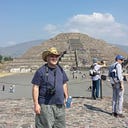Is Consciousness Really Such a ‘Hard Problem’?
Not if we are willing to accept that it is built into the fabric of the universe.
Consciousness is, for many philosophers, considered a baffling mystery. The philosopher David Chalmers is commonly credited with labeling consciousness the “hard problem.” In his book The Conscious Mind: In Search of a Fundamental Theory, he writes:
Conscious experience is at once the most familiar thing in the world and the most mysterious. There is nothing we know about more directly than consciousness, but it is far from clear how to reconcile it with everything else we know. Why does it exist? What does it do? How could it possibly arise from lumpy gray matter?
Elsewhere Chalmers contends:
It [consciousness] is not something that one would have predicted from the other [material] features alone. That is, consciousness is surprising. If all we knew about were the facts of physics, and even the facts about dynamics and information processing in complex systems, there would be no compelling reason to postulate the existence of conscious experience. (Emphasis added)
Chalmers finds consciousness so difficult because he, like so many of his contemporaries and others before him, is starting from the premise that consciousness arises…
